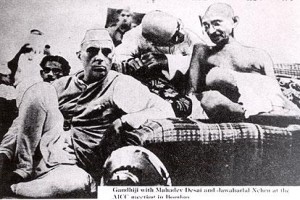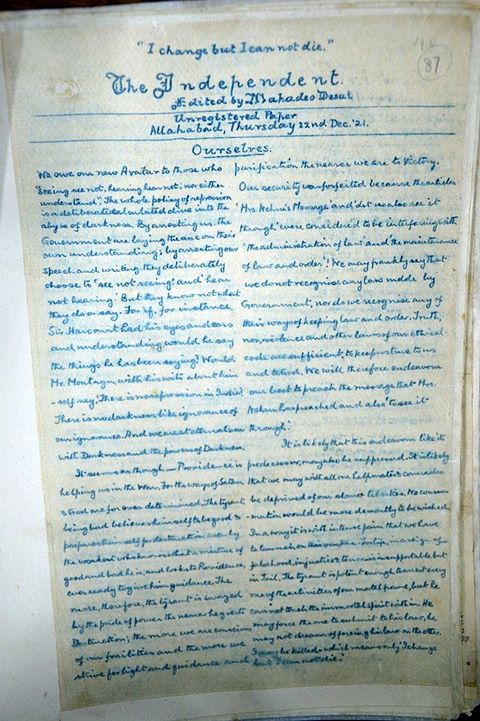
The Independent
Jawaharlal Nehru, Mahadevbhai Desai and Mahatma Gandhi Photos courtesy: Nachiketa Desai
[the_ad_placement id=”adsense-in-feed”]
First Person
 By Nachiketa Desai*
By Nachiketa Desai*
Pen is mightier than sword
[the_ad_placement id=”content-placement-after-3rd-paragraph”]
“Frankly we are at war, and I am standing before you to-day as a prisoner of war. If we, i.e. the non-co-operators, were votaries of force like you, I daresay you or some of you would have been our prisoners of war to-day. But God forbid that we should ever have to capture any human being as a prisoner of war and thereby sin against our Maker.
Unlike my illustrious predecessors here, I am going to assist you more to help myself into jail than to oblige you. We are all rebels and it is a wonder of wonders why you should choose to try us for a smaller offence and omit to do so for a more comprehensive one, viz that of recognizing none of your laws. I do not only not recognize your Criminal Law Amendment Act (C.A.A.), but I recognize none of the mighty ‘Unrepealed Acts of the Governor-General of India in Council.’ I stand here, therefore, ready to suffer the highest penalty that you can inflict on me. I only fear that not all the horrors of any hell that you can consign us to, can force the robust spirit of revolt out of us, and the hypocrisy of loyalty to a loathsome system into us.
And a word of thankfulness before you accept me as a guest in one of the King’s prisons. It is with a sense of positive relief that I shall be relieved of the difficult duty of criticizing Government with truthfulness and yet without rancour. That capacity only my master has acquired. And I am really thankful that I will no longer have to struggle against my baser self; I am thankful that in jail I shall, if your prison regulations permit me, occupy myself with better duties than the present, namely, for instance spinning, and in spite of all your prison regulations, I shall think, with all the power of humility that is given me, of my Maker. I thank you.”
This was Mahadevbhai Desai’s statement before the District Magistrate of Allahabad on December 24, 1921. The District Magistrate sentenced him to one year’s rigorous imprisonment and a fine of Rs.100. In his farewell message to the readers of The Independent of which he was the editor, Mahadevbhai said:
“I had the privilege not long ago of talking to my readers in the first person. I never knew that the privilege would come again so soon. I have been summoned by the District Magistrate to appear before him today to take my trial for charges under Sections 17 (1) of the C.A.A. and 117 I.P.C. This is just as it should be. I have been long expecting it and never thought that the Government whose logic has been stimulated of late would suffer me a rebel to go on breaking the law and denouncing them from day to day.
So it is just as it should have happened. What I thought would not happen is the search which is taking place at The Independent office for all papers and machinery in connection with this my little paper. I referred yesterday to the insanity which is fast overtaking Government. I had not the slightest suspicion then that the disease was not stealthily coming insanity but galloping insanity. Think of the madness to seize manuscripts along with, I suppose, carbon sheets, copying pencils and other harmless instruments to prepare copies, as also the cyclostyle machines which we could borrow from friends but could hardly work successfully. What a brainless, imaginationless and soulless system! I can but pity the miserable agents who are working it.
They have not the brains to think that there are thousands of other ways to disseminate news and views and not the soul to think that even if they stop our mouths and hands and other members of the body from functioning properly, they cannot touch the soul. An old man once said that if we had but the will and the soul, even the breath of carbonic acid gas from the mouths of 30 crore Indians could annihilate the whole of the British Raj and sweep away the Empire.
That soul awakening is fast coming upon us even being quickened by Government insanity.Every moment these days it has been growing upon me that true selfless suffering or penance can crush the mightiest evil on earth and I take leave of you with that conviction stronger within me this morning.”
Mahadevbhai, who through his weekly newsletters was chronicling history as it was happening, created history on December 22, 1921 when he brought out a hand-written manuscript of the newspaper The Independent after the government forfeited its security deposit of Rs.3,000.
Pandit Motilal and Jawaharlal Nehru had started The Independent in 1919 with Syed Hussain as its editor. Hussain had worked as an understudy of B G Horniman, the editor of Bombay Chronicle. However, Hussain soon left for London following which C S Ranga Iyengar and George Joseph became the editors in succession. Pandit Motilal Nehru requested Gandhiji to spare the services of Mahadevbhai as he feared that the government might arrest Iyengar and Joseph any day. And, arrested they were soon.
Mahadevbhai joined The Independent as the deputy editor under George Joseph on July 3, 1921 and took over as the editor on December 7 following the latter’s arrest. Immediately, the government demanded a security of Rs.3,000 from publishers of The Independent. However on December 20, the security was forfeited.
Mahadevbhai decided to issue hand-written copies of the newspaper. Both Motilal and Jawaharlal Nehru were already in jail and the other directors of the newspaper did not allow Mahadevbhai to operate from the office of The Independent fearing police action. Mahadevbhai decided to bring out the newspaper from Anand Bhavan, the residence of the Nehrus. He was able to bring out ten copies of the hand-written newspaper with the help of copying paper, working from 5 in the evening of December 21 to 5 in the morning of the next day.
Being a novelty it became popular and fancy prices were paid for it. “I change, but I cannot die” was the tagline over the masthead. The six-page handwritten newspaper carried editorial on its front page with the title ‘Ourselves’.
Like a true Satyagrahi, Mahadevbhai sent a copy of the hand-written newspaper to the Allahabad Commissioner Mr. Knox along with a cryptic note. The note, written on the letterpad of The Independent ,carried Anand Bhavan, Allahabad as the address.
Dear Mr. Knox,
Now that you have gagged me, I have pleasure in sending you herewith a copy of a manuscript paper I have commenced issuing from today.
Please acknowledge receipt and oblige.
Yours truly,
Mahadev Desai
After this, Mahadevbhai stood in the main square of Allahabad to auction copies of this handwritten six-page newspaper. The copies fetched a fancy price of Rs.300. He had already written the editorial for the next day’s newspaper. He then proceeded to Lucknow and met Pandit Motilal and Jawaharlal Nehru who were lodged in the Lucknow district jail. The Nehrus were delighted to see the hand-written newspaper and instructed the district presidents of the Congress party throughout the United Provinces to bring out similar handwritten newspaper in Urdu and Hindi.

The example of the hand-written Independent was soon followed by the Hindi Swaraj, also from Allahabad, and the Congress in Assamese from Gauhati.[1] Gandhiji was proud of his protégé’s action. He wrote in his weekly, Young India:
“It will be remembered that immediately after Mr. George Joseph’s arrest when a new declaration was made by Mr. Mahadev Desai as publisher and printer, a security of Rs.3,000 was demanded. Under Panditji’s advice the security demanded was lodged and the paper reappeared after a day’s suspension. The security was deposited on the 7th instant. It was forfeited on the 20th. There was no change of tone or policy for there was nothing to change. The Independent was edited by a barrister who wrote always under restraint and with dignity. On Mr. Joseph’s incarceration it was taken up by Mr. Mahadev Desai with whose style the readers of Young India are not unfamiliar. The security was forfeited because of its articles, ‘Let us also see it through’ and Mrs. Nehru’s message. The first contains a list of volunteers and the second is a balanced review of the position. But the local government contend that the articles ‘contain words which have a tendency to interfere with the administration of the law and with the maintenance of law and order. The law we know, the prohibition of the holding of public meetings. And The Independent has certainly in common with the whole of the nationalist Press encouraged interference with such law and order.
But the government will soon find out its mistake. The Independent may die but the spirit that it has evoked among the people cannot die. The Independent may not be printed but it can be written. If the Editor is a trustee for his employers, he has also his own individuality to keep. Mahadev Desai the editor lives, although the printer in him may sleep for a while. And I am hoping that he will now write his paper instead of printing it. The readers will benefit by the enforced condensation of news and editorial notes. For multiplying copies I suggest the use of roneo, cyclostyle or chromograph. And if the law or its arbitrary interpretation permits the government to confiscate even a cyclostyle or a roneo, Mr. Desai’s pen can still serve the country until he himself is confiscated and lodged in the Central Jail of Allahabad. Nationalist press proprietors beware. They may not abandon their mission till the bottom penny has been spent up in the cause.”[2]
When this article of Gandhiji’s appeared in Young India on December 22, 1921, Mahadevbhai had already carried out his master’s desire by bringing out the hand-written Independent. Gandhiji reported in the next week’s issue of Young India under the headline ‘An Unregistered Newspaper’ :
“We have already referred in our last issue to the forfeiture of the security of The Independent. Upon the security being forfeited Mr. Mahadev Desai, nothing daunted, began to issue hand written copies by means of the ordinary multiplying processes. Being a novelty it became popular and fancy prices were paid for it. We are sure that our readers will enjoy this novel newspaper, though we cannot give them the pleasure which the readers of the original must have derived. When Civil Disobedience was started in connection with the Rowlatt Act a similar attempt was made in Bombay. But the government of Bombay, we understand, was advised that a written newspaper could not be described as a newspaper whose publication was punishable in law. But the U.P. government wanted to punish Mr. Mahadev Desai’s effrontery. Therefore he has been tried under section 17(1) of the Criminal Law Amendment Act and Section 117 Indian Penal Code. He has been sentenced to one year’s rigorous imprisonment. We hope that the experiment of publishing a handwritten newspaper will be continued by an unbroken line of editors and the publication will not be suspended for want of men to run the risk of being imprisoned.[3]
After Mahadev Desai’s imprisonment, The Independent was brought out by Gandhiji’s son, Devdas Gandhi, albeit with some difficulty. Wrote Devdas Gandhi in an open letter to the readers of the unregistered, manually brought out copies of The Independent: “We write to beg pardon of our readers for our failure so far to bring The Independent up to the standard we set before ourselves. We acknowledge with regret that our irregular series and bad printing have been the cause of great annoyance to the public. The necessary spade work is still engaging our time and attention, and it will take a few more days to establish efficiency and system. Our cyclostyle and roneo machines betray us frequently…..We may assure our readers Mr. Desai has left his spirit behind. He has left a younger brother in the person of the present Editor-in-charge and a succession of several others to perform his duty.”
Before his imprisonment, in the very first issue of the hand-written newspaper with a tagline of “I change but I cannot die”, Mahadevbhai wrote the following editorial:
“We owe our new avatar to those who seeing see not, hearing hear not, nor either understand. The whole policy of repression is a deliberate, calculated dive into the abyss of darkness. By arresting us the government are laying the axe at their understanding, by arresting our speech and writing they deliberately choose to ‘see not, seeing’ and ‘hear not, hearing.’ But they know not what they do or say. For if, for instance Sir Harcourt (Governor of United Provinces) had his eyes, his ears and his understanding would he say the things he has been saying? Would Mr. Montagu (Britain’s Secretary of State for India) with his wits about himself say, “There is no repression in India”? There is no darkness like the ignorance of our ignorance. And we are at eternal war with Darkness and the Powers of Darkness.
It seems as though Providence is helping us in the war. For the ways of Satan and God are ever determined. The tyrant being bad, believes himself to be good, and prepares himself for destruction even by the weakest, who knows what a mixture of good and bad he is, and looks to Providence ever ready to give him guidance. The more, therefore, the tyrant is swayed by the pride of power, the nearer he goes to destruction; the more we are conscious of our frailties and the more we strive for light and guidance and purification the nearer we are to victory.
Our security was forfeited because the articles “Mrs. Nehru’s Message” and “Let us also see it through” were considered to be “interfering with the administration of law and maintenance of law and order.” We may frankly say that we do not recognise any law made by the Government. Nor do we recognise any of their ways of keeping law and order. Truth, Non-violence and other laws of our Ethical Code are sufficient to keep us true to us and to God. We will therefore endeavour our best to preach the message that Mrs. Nehru has preached and also ‘to see it through’.
It is likely that this endeavour, like its predecessor, may also be suppressed. It is likely that we may with all our helpmates and comrades be deprived of our slave-liberties. No consummation would be more devoutly to be wished. In a way it is intense pain that we have to launch on this venture. For life, in a reign of falsehood, injustice, and terror, is insupportable but in jail. The tyrant is potent enough to arrest every one of the activities of our mortal frame, but he cannot touch the immortal spirit within. He may force the one to submit to his law, he may not dream of forcing his law on the other. I may be killed, which only means, “I change, but I cannot die.”
The same day morning he wrote the editorial for the next day’s newspaper and left for Lucknow to show a copy of the hand-written newspaper to the Nehrus. Mahadevbhai brought out the hand-written newspaper for the next two days till he was summoned by the District Magistrate to appear before him to face trial on charges under Sections 17 (1) of the Criminal Law Amendment Act and 117 of the Indian Penal Code. The police raided the office of The Independent situated at 18 Kutchery Road and seized manuscripts along with carbon sheets, copying pencils and other instruments to prepare copies, as also the cyclostyle machines which Mahadevbhai had borrowed but could hardly operate.
After the magistrate handed down the sentence, Mahadevbhai was sent to the Naini jail where he was treated like a common criminal and kept in solitary confinement in a small, dark cell. He was given a dirty pair of shorts and a vest, and a lice-infested quilt to ward off the chilly winter of December.
In the Naini jail, Mahadev saw prisoners being flogged mercilessly by the jailor for raising the slogan of ‘Mahatma Gandhiji Ki Jai’. He was transferred to the Agra District Jail after two weeks to be kept with other political prisoners. While being taken to Agra from Allahabad, he smuggled out a long letter to Gandhiji describing the inhuman living conditions in jail.
Gandhiji, who firmly held that all non-co-operation prisoners must scrupulously abide by the prison rules, made an exception to Mahadev’s ‘illegal’ act of smuggling out the letter and published it in Young India. Justifying his decision to publish Mahadev’s letter Gandhiji wrote:
“It is possible that the posting of the letter is a breach of jail discipline. I hate any breach of discipline but in this instance I have no choice. Duty compels me to publish the letter as it has compelled Mr. Desai to post the letter. I do not mind Mahadev Desai being rewarded with flogging for the indiscipline which is certainly more mischievous than the refusal to wear lousy clothes or the innocent shouts of jais.” – Young India, January 19, 1922. (See Flogging in Prison)
Within a week of his release from jail on January 23, 1923, Mahadev took up the responsibility of editing and writing for the Navajivan and Young India as Gandhiji, the editor, had been jailed for his writings.
References :
[1] Young India, February 2, 1922
[2] Young India, December 22, 1921
[3] Young India, December 29, 1921
*The writer is a senior journalist
[the_ad_placement id=”sidebar-feed”]






Like!! Great article post.Really thank you! Really Cool.